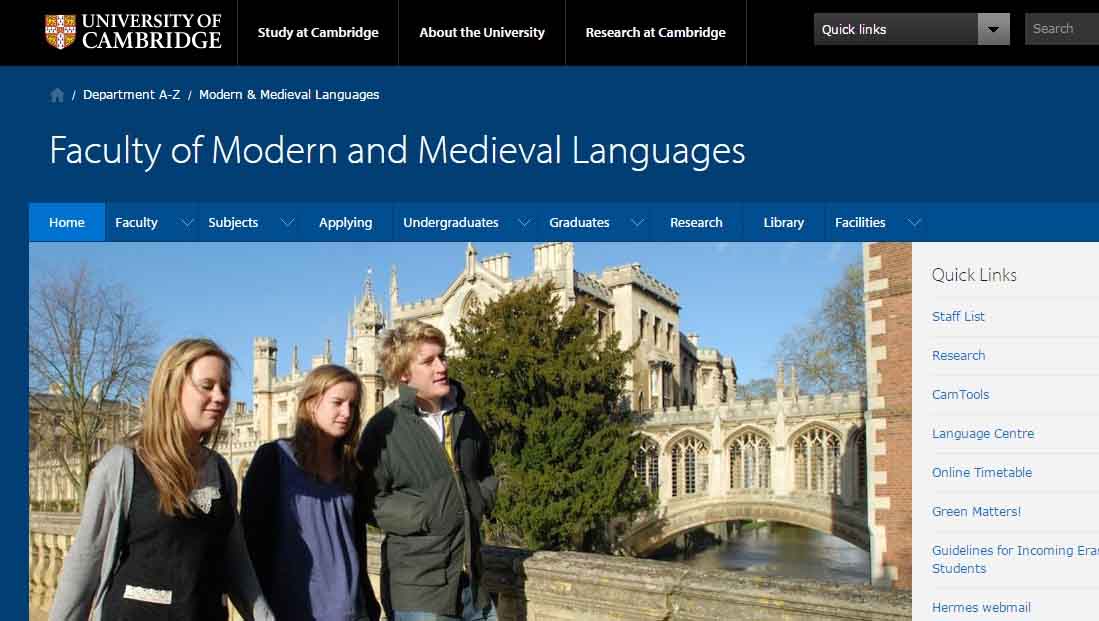
09-30
2021
Cambridge - Modern and Medieval Languages
Everyone's interview experience at Cambridge is different, and there is no way of knowing for certain what you may be asked. However, for MML it is almost certain that you will have at least two interviews (one for each language) and sit a short writte...
<p><strong>Q. Briefly tell us about your interview</strong></p><p> </p><pre>A. I had two interviews, with the written test in the middle. I arrived very early, but the college provided a room for applicants to sit, prepare and chat while they are waiting. While there, I met someone applying for Spanish and ab-initio Russian (I was applying for French and ab-initio Russian) and it was good to have someone to share my nervousness with, even if the atmosphere was a bit strange because we knew that technically we were competing.<p> </p>My first interview was for French and a poem had been left for me outside the interview room, which I had 15 minutes (I think) to read through before being called in. Although I wasn't given a title or poet at the time, I later found out it was Rimbaud's "Il pleut doucement sur la ville." Although I was prepared to speak about the poem in French, when I went in to the room, they began by asking about it in English. I had two interviewers - my prospective Director of Studies and one of the College French fellows, who led the discussion and asked most of the questions. They asked me about what I thought the poem meant, and whether I could pick out poetic devices and how they helped to convey the poet's meaning, before picking out a few words to see if I understood, which I didn't! After this point, I was asked to continue the conversation in French and they asked me about the reading I had done, indirectly referring to my personal statement, although never to the specific essays I had submitted. For this part of the interview, I was very glad that I had practised my conversational French a lot before arriving, and it is certainly advisable to make sure you can discuss your academic interests in your chosen language before you arrive.<p> </p> After this interview, I had to sit a short written test, which was a disaster for me! Fortunately, having looked once again at the MML website, the format for this test seems to have changed slightly, so I won't dwell. Previously, you were required to respond to a series of questions about a text written in ENGLISH in one of your chosen languages, but now there are two questions - one to be answered in your foreign language, and one in English. There is only a limited amount that can be done to prepare for this test, beyond developing your writing ability in the foreign language, and the test shouldn't prove too much of a challenge, provided that you grasp the meaning of the original English text, which proved a challenge for me!<p> </p> For my final interview, I had to move to a different college, where I was interviewed on ab-initio Russian. This was a strange experience because I knew no Russian at all, beyond the alphabet, so the interview was, of course, entirely in English. However, if you do claim to know your ab-initio language to any basic level, do prepare to be tested on this! In my case, the interviewer presented me with some simple sentences written in Russian on one side of the paper and transliterated into the latin alphabet on the other side. I was asked first to try to pronounce the Russian words, and then to try to point out the various linguistic components of the transliterated sentences (nouns, verbs etc.). This part of the interview was about showing how I was able to problem solve, and come up with possible solutions to explain the differences in the sentences (different tenses, plurals, genders, imperfective and perfective actions etc.). After this, we discussed the reading I had done in translation, and a few of the films I had watched. The questions were fairly general and allowed me to focus on the areas I had found most interesting.<p> </p> Each of my interviews was around 20-30 minutes long, and the discussion was roughly split 50/50 between speaking in English and French for my first interview.</pre><p> </p><p><strong>Q. Advice for prospective languages applicants?</strong></p><p> </p><pre>A. My main piece of advice is to read widely before your interview, even if the reading is done in translation. Watching films is also a quick and effective way to broaden your cultural knowledge of the languages you are applying for, and may allow you to draw up some effective links in your personal statement between the texts you have encountered. The Cambridge course (and probably the Oxford one) are fairly heavily centred on cultural topics, and it is important to show that you can express yourself well in English as well as your foreign language.<p> </p> In terms of foreign language work, I found personally that regular discussion classes with a French tutor were extremely useful, because they meant that by the time I got to the interview I was already practised in discussing what I had read and what my views were about the texts. Doing a couple of mock interviews with teachers at school was also a very useful experience. Finally, remember that the interview format is designed to be just like a real supervision you might have once you're at Cambridge. Your interviewers want to find someone who will be active in weekly discussions and who shows a passion for engaging analytically with texts. They don't expect you to know everything, but they expect to see you making an attempt to work your way through the question, so don't be afraid to speak out loud and venture ideas even if you think they may be wrong!</pre><p> </p>